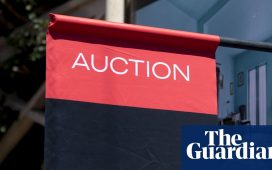Donald Trump, his eldest sons and associates have been ordered to pay over $350m by a New York judge who found them guilty of intentionally committing financial fraud over the course of a decade.
Judge Arthur Engoron’s decision deals a devastating blow for the former president who had built his reputation as a successful real estate developer. Engoron issued a five-year ban for Donald Trump Jr and Eric Trump, who were also defendants in the case.
Engoron also barred Trump and others from serving as an officer or director of any New York corporation or entity in New York for three years.
The ruling marks the conclusion of a case that was years in the making. The New York attorney general, Letitia James, first announced she was investigating Trump’s real estate business in 2021.
Trump has denied all wrongdoing and will likely appeal the decision.
Prosecutors had asked Engoron for a lifetime ban along with $370m, the amount they said Trump had profited after lying about his net worth and receiving lower interest rates from lenders.
The ruling is a follow-up to a pre-trial judgment Engoron issued in September based on documented evidence. Engoron ruled Trump had misrepresented his net worth to lenders and ordered the cancellation of the Trump Organization’s business certificates, essentially ending its ability to continue operation in New York. An appellate court is still reviewing the pre-trial ruling.
The actual trial was held to determine whether Trump would have to pay a fine. Prosecutors had to show Trump and the other defendants, including Trump’s adult sons and former Trump Organization executives Allen Weisselberg and Jeff McConney, had acted with intent. Forty witnesses testified during the three-month trial.
Prosecutors argued that Trump had lied on government financial statements, allowing him to receive more favorable loans from lenders. One of the most striking examples in the case concerned Trump’s triplex apartment in Trump Tower, which records showed was reported to be 30,000 sq ft but is closer to 11,000 sq ft.
The court also heard that Trump overvalued his Seven Springs estate in Westchester County, New York, telling lenders that the property had development potential, though local residents had blocked Trump’s plans for the property. Trump also valued multiple rent-stabilized apartments in his Trump Park Avenue condominium at market rates.
Trump’s team tried to argue that the valuations were “worthless” because they contained a clause saying as much, an argument the judge rejected.
His lawyers also argued that the discrepancies were the fault of outside advisers and accounting errors, though they persisted for years and contradicted outside appraisals the company had received.
On the stand, Trump argued he could just look at a building and decide its worth. “All you have to do is look at a picture of the building and say: ‘That building,’” Trump said, talking about the Trump office building at 40 Wall Street. “You just look at it and you say: ‘That’s worth a lot more than $550m.’”
after newsletter promotion
Engoron initially signaled he would deliver a verdict by the end of January, but two developments threw off his timeline.
On January 26, former federal judge Barbara sent a letter to Engoron detailing “certain deficiencies” in the Trump Organization’s financial reports. Since November 2022, Jones has been serving as the court-appointed monitor overseeing the company’s financial reporting since November 2022.
In her letter, Jones said that there were “disclosures that are either incomplete, present results inconsistently, and/or contain errors”.
Jones had warned that while she is “not in a position to conclude whether fraudulent activity occurred”, she noted that “absent steps to address [the deficiencies], my observations suggest misstatements and errors may continue to occur”.
While Jones’ letter seemed to be the initial cause of the delay, the New York Times on February 1 reported that Weisselberg, the Trump Organization’s former chief financial officer, was negotiating a potential plea deal with the Manhattan district attorney’s office. Weisselberg reportedly considered pleading guilty to lying on the stand during the fraud trial in exchange for not having to be a witness for Trump’s separate hush money case, which the district attorney’s office is prosecuting.
After Engoron asked for an explanation on the Times’ report, lawyers for both sides dismissed the report as irrelevant to the case and asked the judge to deliver the verdict as scheduled.










